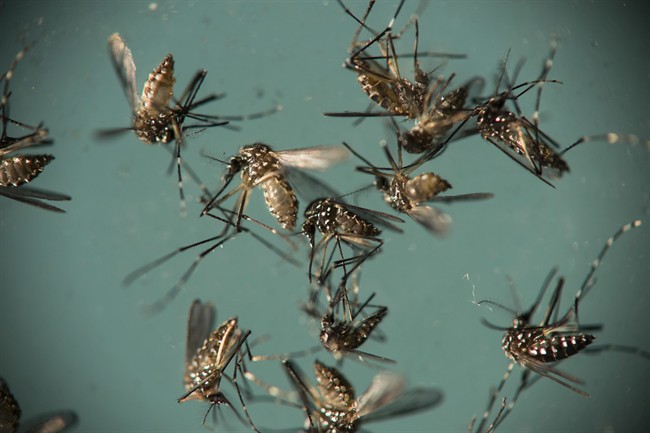
On this episode of the Global News podcast What Happened To…?, journalist Erica Vella revisits the Zika virus epidemic that infected hundreds of thousands of people in South America in 2015 and 2016.
Brazil was among one of the countries most affected by the Zika virus but Dr. Carlos Pardo, a professor at Johns Hopkins University, said the virus emerged in the 1950s.
“It was relatively known to a virologist, but not necessarily very well known to public health officials in the world and really emerged as a major threat after the outbreaks in French Polynesia that spread very quickly to other areas of the world, including Latin America in 2015 and 2016,” Pardo said.
Zika virus is an arbovirus — a type of virus that is transmitted by certain kinds of insects like mosquitos.
The ades Aegypti mosquito, which is primarily found in tropical climates, is a known carrier of the virus.
“During an outbreak situation, individuals that are infected actually replicate or grow a significant amount of virus in their blood,” said Dr. Michael Drebot, director of the zoonotic diseases and special pathogens division at the National Microbiology Laboratory in Winnipeg.
“So when a mosquito comes and bites an individual and takes a blood meal, they will uptake the virus and then they’ll fly to another individual and give the virus to them. So this transmission cycle of person to mosquito to person again really drives the outbreaks.”
Zika can also be sexually transmitted.
“It was noted back in 2016 that some subjects actually had a very important persistence of viruses in semen,” Pardo said.
READ MORE: Mosquito species capable of carrying Zika virus caught in Windsor, Ont.
“It has been demonstrated that even in women, there is evidence of Zika presence in mucosal secretions and body secretions. So the possibility that men may be able to transmit Zika is quite clear.”
In 2015, Germana Soares, who lives in Brazil, was infected with Zika virus.
“I got an immense itch in the body. In the beginning, I thought I had eaten something that had poisoned me. And it seemed like an allergic reaction process. I itched a lot,” she said through a translator.
Soares was 12 weeks pregnant when she became ill, but at the time, doctors believed there was no harm to the baby.
“The emergency health professionals, told me that I was with the Zika, but it was going to be okay. They said Zika was similar to Dengue. And that it would not be a big deal. At the time, no one imagined it. Then she prescribed me an anti-allergic and I’ve made a few ultrasounds, and nothing was pointed out.”
READ MORE: Here’s how hard Zika virus hit Canadian tourists last year
In November, just before she gave birth, Soares said local news stations began reporting a link between Zika and microcephaly with women who were pregnant.
“Then I got in touch with the obstetrician. Told about the possibility. He told me that there wasn’t much to do. That now was to wait for Guilherme’s birth to submit him to exams. And this was it happened. Four days later, Guilherme was born, and they made a few tests with him,” she said.
Days after his birth, doctors confirmed the diagnosis; Guilherme had microcephaly.
“We didn’t tell anyone, not to family members, not friends. I used to work. I quit from the company, and went to take care of treatment for Guilherme. So with 20 days of life, Guilherme had already all the treatments by Unified Health System. Everything he needed at that moment. So I began to dedicate my life for him. For his quality of life. So I promised that while he wouldn’t talk, I would give him a voice. While he wouldn’t walk, I would walk and fight for him. And this is what I’ve been doing.”
Pardo said only 20 per cent of infected people show symptoms, but the risk rests with pregnant mothers as Zika is known to also cause Congenital Zika Syndrome and microcephaly in fetuses.

“Microcephaly is the medical term assigned to a small brain,” Pardo explained.
Microcephaly occurs in these children when their mothers are infected with Zika while pregnant, he said. The fetus develops viral illness and eventually encephalitis.
“This means the inflammation of the fetal brain or inflammation of the developing brain, and that inflammatory reaction and that viral infection actually produces quite extensive damage of the cells that were facilitating the growth of the brain,” Pardo said.
The World Health Organization estimated at the height of the epidemic, there were over 216,207 probable cases of acute Zika virus disease reported in Brazil, and thousands of babies were born with complications.
Anis Institute for Bioethics, a not-for-profit organization in Brazil, has been one of the leading organizations advocating for women and families affected by the Zika epidemic.
READ MORE: 1 in 10 U.S. moms infected with Zika have babies with birth defects: report
Luciana Brito, researcher and psychologist for Anis Institute for Bioethics, said since the beginning of the epidemic, over 19,000 babies have been born with suspected Congenital Zika Syndrome.
“These numbers represent lives,” Brito said. “The lives of children affected by Zika, they are not babies anymore.”
On this episode of What Happened To…?, Erica Vella revisits the 2015 Zika epidemic and finds out if the virus is still a threat. She also speaks with the families impacted virus who share what life has been like.
Contact:
Email: erica.vella@globalnews.ca
If you enjoy What Happened To…? please take a minute to rate it on Apple Podcasts or Google Podcasts, tell us what you think and share the show with your friends.
If you haven’t subscribed yet — what are you waiting for?
Subscribing’s easy! Here’s how…

- Open the Apple Podcasts app, search for “What Happened To?” and select it from the list of results.
- Once on the What Happened To? page, click the “subscribe” button to have new episodes sent to your mobile device for free.
- Click the name of an episode from the list below to listen.

- Open the Spotify app, search for “What Happened To?” and select it from the list of results.
- Once on the What Happened To? page, click the “Follow” button to have new episodes sent to your mobile device for free.
- Click the name of an episode from the list below to listen.




Comments